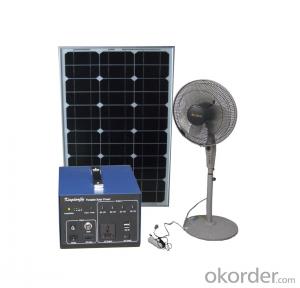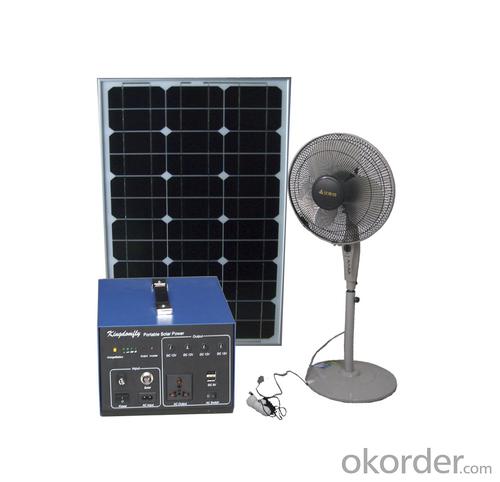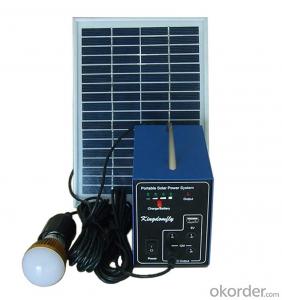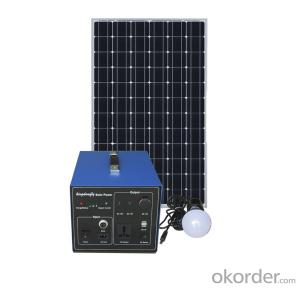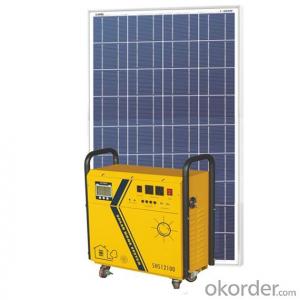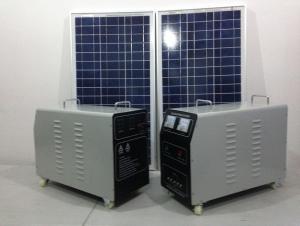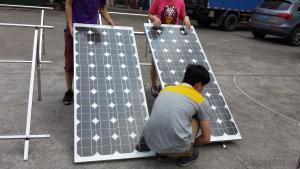2 Types of Solar Energy Systems - Portable Solar Lighting System Hot Selling SPS_50W
- Loading Port:
- China main port
- Payment Terms:
- TT OR LC
- Min Order Qty:
- 3 pc
- Supply Capability:
- 10000 pc/month
OKorder Service Pledge
OKorder Financial Service
You Might Also Like
Main Information
SPS_50W This product is high performance,family used portable solar power system,which can receive energy and store it in battery outside connected to SPK by solar energy on sunny day,and supplies electric power for varies appliances such as electric fan,lighting lamps, television, portable computer etc.It can supply power for both DC and AC electric application .It’s very helpful and useful for home electric supply.
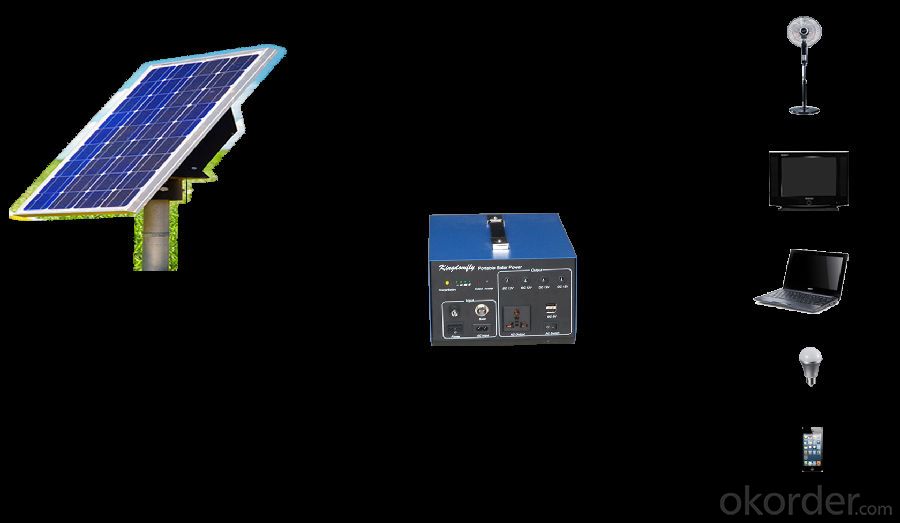
Features
◆ Both Solar charge input and AC charge input.
◆ Both DC and AC output
◆ Solar Feedback Circuit Protection
◆ Output Short-circuit Protection
◆ Solar「+」「-」anti-access protection
◆ Output「+」「-」anti-access protection
◆ Over Charged Protection
◆ Over Discharged Protection
◆ Over Load Protection
◆ Over-Temperature Protection
Technical parameters
Specification | Value/Material | |
Item No. KDF | SPS_50W | |
Solar Recommended | Specification | Poly silicon |
Working Voltage/Power | 18V45~60WP | |
Battery | Rated Voltage/Capacity | 12V26AH |
Cycle Number | 80% Deep Cycle Number:500 70% Cycle Number:800 | |
Working Temperature | Short Period(one Month):-20~50℃ Long Period(Six Months):-10~45℃ | |
Charging Controller | Operating Voltage | 12V |
Input Voltage | 17.3V~21V | |
Input current | MAX:10A | |
Power Consumption | MAX: 5mA | |
Low Voltage Disconnect(LVD) | 10.8V | |
Low Voltage Reconnect(LVR) | 12.3V | |
High Voltage Discharge( HVC) | 14.6V | |
High Voltage Recharge(HVR) | 13.8V | |
Temperature Protection | 60℃ | |
DC Output | DC output & Application | USB 5V1A*2 |
DC output & Application | DC 12V1*4A | |
AC Output | Output Wave | Modified Wave |
Input Voltage | 11V~15V | |
Output Voltage | 110V±10% | |
Output Frequency | 60Hz±2Hz/50Hz±2Hz | |
Rated Output Power | 200W | |
Maximum VA | 400VA | |
Maximum Efficiency | 88% | |
Temperature | 0-40℃ | |
Over Temperature | 60℃~70℃ | |
Low Voltage Alarm | 11V | |
Low Voltage Shut off | 10.5V | |
High Voltage Shut off | 16V | |
Package | Set size | 328*252*267mm |
Set N·W | 11.6kg | |
Set N·W | 12.8kg | |
- Q: Can solar energy systems be used in powering warehouses or distribution centers?
- Yes, solar energy systems can be used to power warehouses or distribution centers. Solar panels can be installed on the roofs of these buildings to convert sunlight into electricity, which can then be used to meet their energy needs. This can help reduce reliance on traditional energy sources and lower operating costs while also promoting sustainability.
- Q: How do solar energy systems impact wildlife?
- Solar energy systems can have both positive and negative impacts on wildlife. On the positive side, they offer renewable energy, reducing the need for fossil fuels and reducing air and water pollution. Additionally, solar panels can provide shelter and shade for certain species. However, there are also negative impacts to consider. Large-scale solar projects can lead to habitat destruction, displacement of wildlife, and disruption of migration patterns. Additionally, the glare from solar panels can disorient birds and insects. To minimize these impacts, it is crucial to carefully plan and design solar projects, considering the needs and habitats of local wildlife.
- Q: Can solar energy systems be used for powering mining or drilling operations?
- Yes, solar energy systems can be used to power mining or drilling operations. Solar panels can generate electricity in remote locations where it may be challenging or expensive to bring in traditional power sources. This renewable energy source can help reduce the environmental impact of mining and drilling operations by reducing reliance on fossil fuels. Additionally, solar energy systems can provide a reliable and sustainable power supply for these energy-intensive operations.
- Q: Do solar energy systems require batteries for energy storage?
- Batteries are not always required for energy storage in solar energy systems. While they can store extra energy generated by solar panels for later use, they are not essential. In grid-connected solar systems, excess energy can be sent back to the utility grid, allowing homeowners to draw power from the grid when their panels are not producing enough. This eliminates the need for batteries as the grid acts as a virtual storage system. However, for off-grid systems or areas with unreliable grid access, batteries are commonly used to store excess energy. Ultimately, whether or not batteries are used in a solar energy system depends on the specific circumstances and requirements of the installation.
- Q: Can solar energy systems be used for powering water pumps?
- Yes, solar energy systems can be used for powering water pumps. Solar-powered water pumps utilize photovoltaic panels to convert sunlight into electricity, which can then be used to run the pumps. These systems are especially useful in remote areas where access to electricity is limited.
- Q: Are there any safety concerns with solar energy systems?
- Yes, there are some safety concerns associated with solar energy systems. These concerns include potential electrical hazards during installation or maintenance, fire risks due to faulty wiring or improper installation, and the release of hazardous materials during the manufacturing or disposal of solar panels. However, it is important to note that these risks can be minimized through proper installation, regular maintenance, and adherence to safety standards and regulations.
- Q: Can solar energy systems be used in areas with high levels of wildlife activity?
- Yes, solar energy systems can be used in areas with high levels of wildlife activity. While it is true that wildlife can pose some challenges for solar energy systems, there are several ways to mitigate these issues. One of the primary concerns is the risk of damage to the solar panels by large animals or birds. However, there are various protective measures that can be taken to prevent this. For instance, installing fencing or barriers around the solar panels can help keep wildlife away. Additionally, using anti-reflective coatings on the panels can reduce the likelihood of bird collisions. Another concern is the impact of solar energy systems on wildlife habitats. It is crucial to choose the location of the solar panels carefully, considering the existing wildlife activity in the area. By conducting thorough environmental impact assessments and engaging with local wildlife experts, it is possible to minimize any potential negative effects on wildlife habitats. Moreover, solar energy systems can actually benefit wildlife in some cases. For example, solar farms can provide additional shelter and shade for some species, and the open spaces underneath the panels can create new habitats for ground-dwelling animals. Overall, while there may be some challenges, with proper planning and mitigation strategies, solar energy systems can be successfully utilized in areas with high levels of wildlife activity.
- Q: Are there any risks of electrical grounding issues with solar energy systems?
- Yes, there can be risks of electrical grounding issues with solar energy systems. Improper grounding or lack of proper grounding can lead to electrical shocks, system malfunctions, and even fire hazards. It is crucial to ensure that solar panels, inverters, and other electrical components are correctly grounded to minimize these risks and ensure the safe and efficient operation of the system.
- Q: Can solar energy systems be used for powering off-grid oil platforms?
- Yes, solar energy systems can be used for powering off-grid oil platforms. These platforms can install solar panels to generate electricity, which can be used to power various operations on the platform such as lighting, communication systems, and equipment. Additionally, excess energy can be stored in batteries for use during periods of insufficient sunlight. The use of solar energy can reduce the reliance on fossil fuels and lower the environmental impact of these platforms.
- Q: What is the impact of roof color on the performance of solar panels?
- The impact of roof color on the performance of solar panels is minimal. While darker roofs may absorb more heat, they do not significantly affect the overall efficiency or output of solar panels. The performance of solar panels primarily depends on factors such as the angle and orientation of the panels, the presence of shading, and the quality of the solar cells themselves.
Send your message to us
2 Types of Solar Energy Systems - Portable Solar Lighting System Hot Selling SPS_50W
- Loading Port:
- China main port
- Payment Terms:
- TT OR LC
- Min Order Qty:
- 3 pc
- Supply Capability:
- 10000 pc/month
OKorder Service Pledge
OKorder Financial Service
Similar products
Hot products
Hot Searches
Related keywords
